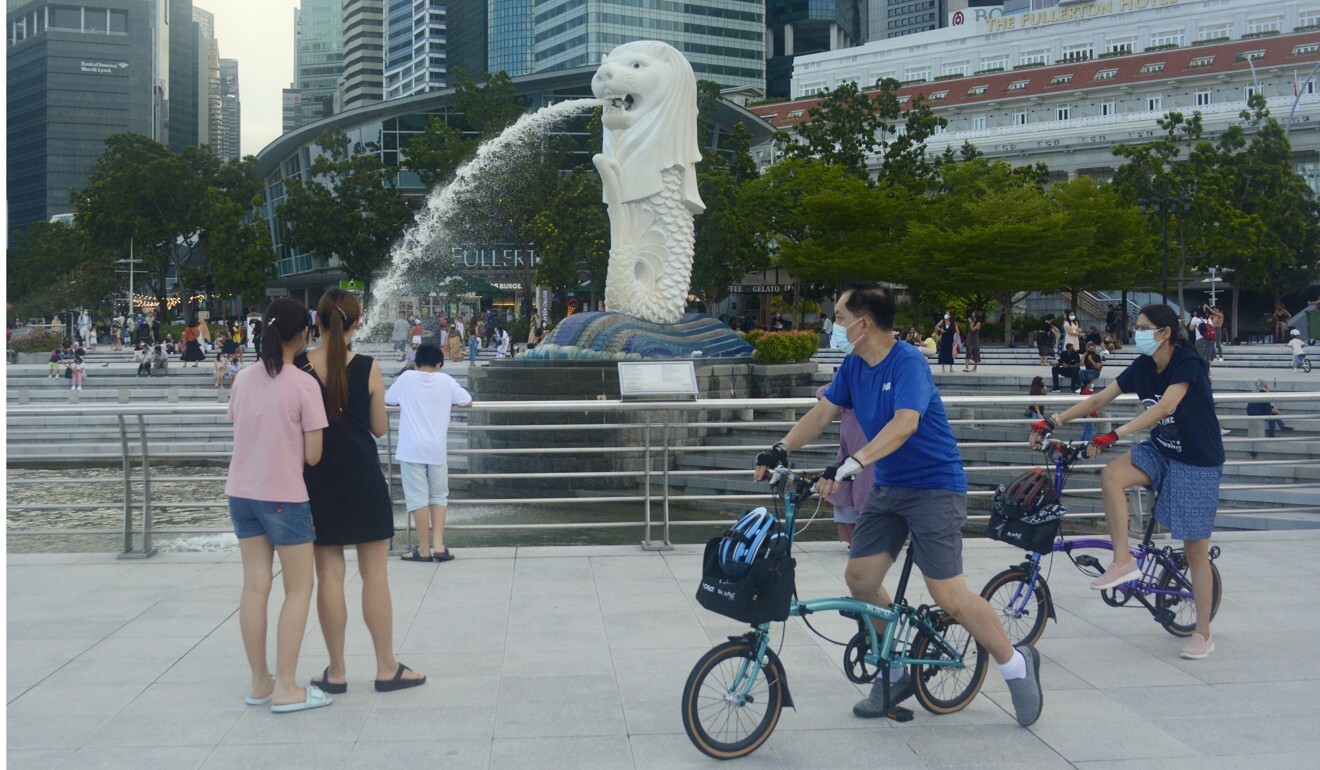
Coronavirus: Singapore extends two-person limit on dining in, social gatherings as hospitals risk ‘being overwhelmed’
- Two-person limit on groups will stay until November 21, as minister Lawrence Wong warns isolation beds and intensive care units are filling up
- But city state is pushing on with border reopenings amid other positive signs. While cases show no indications of falling, 99 per cent experience mild symptoms or none at all
The measures – which limit dining in and all social gatherings to groups of two – have caused frustration among vaccinated residents who had hoped authorities would speed up a plan to “live with the virus”.
But Lawrence Wong, the finance minister and co-chair of the government’s virus task force, warned that if the present trajectory continued Singapore would “face considerable risk of the health-care system being overwhelmed”.
He said that close to 90 per cent of the country’s hospital isolation beds had been filled, and more than two-thirds of its 200 intensive care units (ICUs) were occupied.
Health minister Ong Ye Kung said more ICU beds would be opened up if necessary – taking the number to 300 – but that would come at the expense of normal medical care. He had in July said that Singapore was able to increase ICU capacity to 1,000.
Addressing calls from the Restaurant Association of Singapore to allow people from the same household to dine out in groups of up to five, Wong said the government was looking into this but “for now, we think it’s still too risky”.
The present measures, dubbed by the government as the “Stabilisation Phase”, came into force on September 27 and had been due to expire next Monday.

They will now last until November 21, though Wong emphasised that the restrictions were not “frozen or static”. The task force would review the situation continuously to see if the restrictions could be eased earlier, he said.
Authorities are hoping that as more residents receive their booster vaccinations, overall immunity in society will increase and infections fall.
When that happens, Singapore can “open up social and economic activities. And then, we would have achieved a new equilibrium with the virus, and that is what we are working towards,” said Ong.
Singapore’s coronavirus cases could reach 10,000 a day
Ong, during a doorstop interview on Wednesday, said there were positive signs in the country’s fight against the virus – cases were no longer doubling every other day, and more patients were experiencing either mild symptoms or none at all.
In the past 28 days, out of about 75,000 cases, nearly 99 per cent had either mild symptoms or none at all. About one per cent needed oxygen support and 0.1 per cent required intensive care.
Yet there has been no sign of daily cases falling and the number of unvaccinated seniors catching the virus remains high.

04:47
Hong Kong should follow Singapore’s lead and drop ‘zero case’ approach to Covid-19
Hospitals, Ong said, were bracing themselves for heavy patient loads and the ministry was strengthening its manpower through redeployment but medical personnel were fatigued.
Wong said this was “probably the most difficult phase” in Singapore’s Covid-19 journey. “But this phase will not last indefinitely. At some point, the wave will peak.”
The city state has been grappling with an exponential increase in cases for weeks as it forges ahead with its “living with Covid-19” plan.
On Tuesday, there were 3,994 new infections. However, most cases are mild due to the country’s high vaccination rate, with about 84 per cent of the population fully vaccinated.
As other economies race back to travel, Hong Kong faces hermit risk
Meanwhile, authorities are pushing forward with border reopening plans.
The island nation on Tuesday started quarantine-free travel lanes for vaccinated people from eight more countries, including the United States and Britain. It already has similar arrangements with Germany and Brunei.

